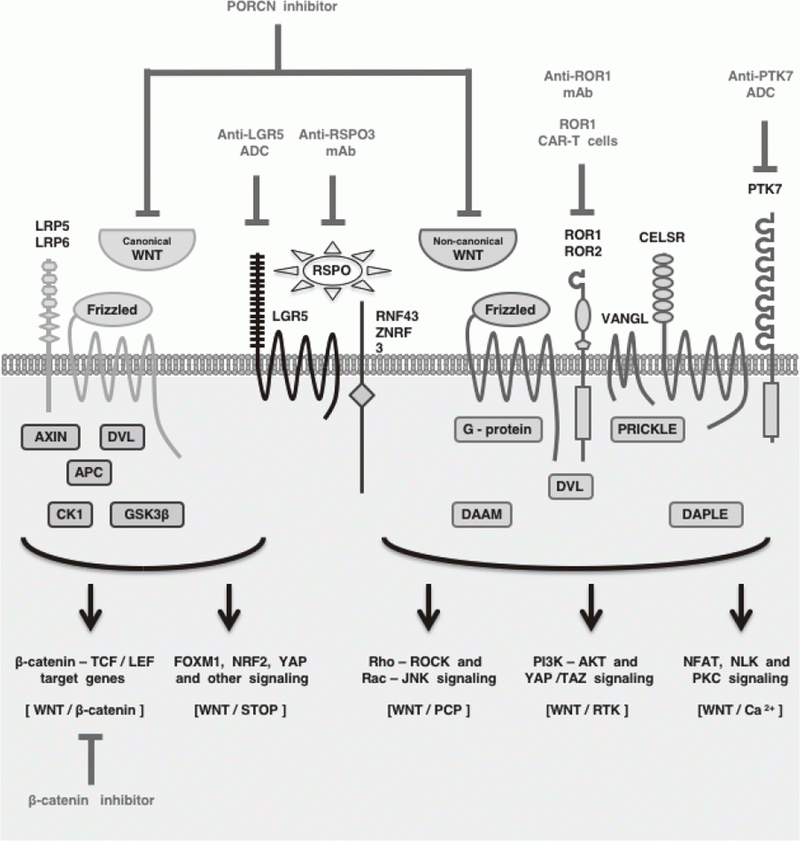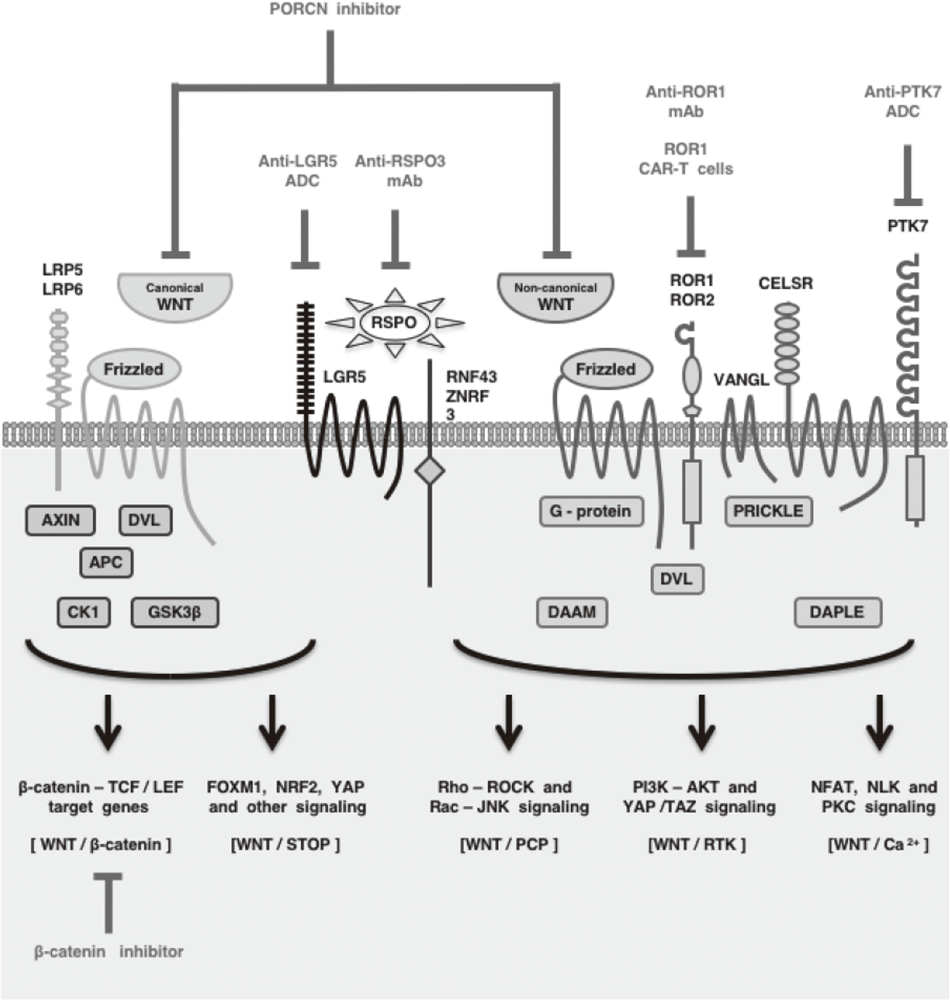Annual Report 2017
Department of Omics Network
Masaru Katoh
Introduction
The Department of Omics Network is involved in innovation based on the balance between its main world-class projects and cutting-edge new projects. The FGF (PMID: 23696246), Hedgehog (PMID: 19860666), Notch (PMID: 17143535) and WNT (PMID: 17634527) signaling cascades and the Forkhead-box (FOX) family of transcription factors (PMID: 23022474) have been the main (fundamental) projects of our department. Angiogenesis, cell adhesion, epigenetics and immune evasion in the tumor microenvironment have been new (cutting-edge) projects of our department. To maintain competitiveness in the global scientific community with continuous and dynamic changes, our department is currently concentrating its resources on the FGF and WNT signaling cascades.
Masaru Katoh was engaged in clinical medicine from 1986 to 1990, basic medicine from 1990 to 2002 and information science from 2003 to 2011. Since 2012, Masaru Katoh has been engaged in the Knowledge-Base Project to move toward omics-based precision medicine.
Research activities
1. Genomics testing and FGF receptor (FGFR)- targeted therapy
Next-generation sequencing (NGS)-based genomic tests detect alterations in more than 300 cancer-related genes, including FGFR1, FGFR2, FGFR3 and FGFR4 as well as ALK, AXL, CSF1R, DDR2, EGFR, EPHA3, EPHA5, EPHA7, EPHB1, ERBB2, ERBB3, ERBB4, FLT1 (VEGFR1), FLT3, FLT4 (VEGFR3), IGF1R, KDR (VEGFR2), KIT, MET, NTRK1, NTRK2, NTRK3, PDGFRA,
PDGFRB, RET and ROS1, in a single assay.
FGFRs and receptor tyrosine kinases (RTKs) men-
tioned above are or will be the targets of cancer therapies.
In the field of clinical genomics, the trade-off between cheaper panel-based genomic tests with relatively increased nontreatment decisions and expensive whole-genome analysis with relatively decreased nontreatment decisions is an issue of controversy.
Whole-genome sequencing and functional proteomics, which have been applied for the development of precise genomic testing and a whole spectrum of therapeutic options, respectively, are necessary for both the practice of personalized medicine at present and the implementation of precision medicine in the future.
2. WNT signaling-targeted therapy
Masaru Katoh and his colleagues carried out the Human WNTome and Post-WNTome Projects to construct a platform of medical WNT research in the late 1990s and early 2000s. Canonical WNT signaling through Frizzled and LRP5/6 receptors is transduced to the WNT/b-catenin and WNT/stabilization of proteins (STOP) signaling cascades to regulate cell fate and proliferation, whereas non-canonical WNT signaling through Frizzled or ROR receptors is transduced to the WNT/planar cell polarity (PCP), WNT/G
protein-coupled receptor (GPCR) and WNT/RTK signaling cascades to regulate cytoskeletal dynamics and directional cell movement.
Anti-FZD1/2/5/7/8 monoclonal antibody (mAb) (vantictumab), anti-LGR5 antibody-drug conjugate (ADC) (mAb-mc-vc-PAB-MMAE), anti-
PTK7 ADC (PF-06647020), anti-ROR1 mAb (cirmtuzumab), anti-RSPO3 mAb (rosmantuzumab),
small-molecule porcupine inhibitors (ETC-159, WNT-C59 and WNT974), tankyrase inhibitors (AZ1366, G007-LK, NVP-TNKS656 and XAV939) and b-catenin inhibitors (BC2059, CWP232228, ICG-001 and PRI-724) are investigational drugs in clinical trials or preclinical studies for the
treatment of patients with WNT-driven cancers (Figure 1).


Preclinical studies indicate that WNT
signaling-targeted therapeutics might be applicable for combination therapy with BCR-ABL, EGFR, FLT3, KIT or RET inhibitors to treat a subset of tyrosine kinase-driven cancers because WNT and tyrosine kinase signaling cascades converge to b-catenin for the maintenance and expansion of cancer stem cells (CSCs).
WNT signaling-targeted therapeutics might also be applicable for combination therapy with immune checkpoint blockers, such as atezolizumab, avelumab, durvalumab, ipilimumab, nivolumab and pembrolizumab, to treat cancers with immune evasion, although the context-
dependent effects of WNT signaling on immunity should be carefully assessed.
Other research activities
Meta-analysis of b-catenin expression in non-small cell lung cancer (NSCLC) was carried out as an international collaborative study with researchers in Australia, China and USA. An editorial on combination immuno-oncology therapy with immune checkpoint blockers and epigenetic drugs was also published.
Contribution to the global scientific community
Masaru Katoh has been contributing to the global scientific community through manuscript publication, reviewer activity, and editor activity. Katoh carried out peer reviews of grant proposals or journal manuscripts written in English 42 times in 2017. Katoh is a member of the International Expert Panel of the National Medical Research Council (NMRC) of Singapore. Katoh is an Academic Editor of a USA-based journal, PLoS ONE,
and carried out editorial decisions 168 times in 2017. Masaru Katoh is the Chief Editor of a
Switzerland-based journal, Frontiers in Molecular Medicine, that aims to address the gap between cell and developmental biology and clinical medicine, together with 148 editorial board members.
The manuscript citation count in the Web of Science Database is a surrogate marker of the
contribution to the global scientific community. Katoh's manuscripts were cited approximately 600 times by others in 2017.
List of papers published in January 2017 - March 2018
Journal
1. Katoh M, Katoh M. Molecular genetics and targeted therapy of WNT-related human diseases. Int J Mol Med, 40:587-606, 2017
2. Jin J, Zhan P, Katoh M, Kobayashi SS, Phan K, Qian H, Li H, Wang X, Wang X, Song Y. Prognostic significance of β-catenin expression in patients with non-small cell lung cancer: a meta-analysis. Transl Lung Cancer Res, 6:97-108, 2017
3. Katoh M. Canonical and non-canonical WNT signaling in cancer stem cells and their niches: Cellular heterogeneity, omics reprogramming, targeted therapy and tumor plasticity. Int J Oncol, 51:1357-1369, 2017
4. Katoh M. The integration of genomics testing and functional proteomics in the era of personalized medicine. Expert Rev Proteomics, 14:1055-1058, 2017
5. Katoh M. Antibody-drug conjugate targeting protein tyrosine kinase 7, a receptor tyrosine kinase-like molecule involved in WNT and vascular endothelial growth factor signaling: effects on cancer stem cells, tumor microenvironment and whole-body homeostasis. Ann Transl Med, 5:462, 2017
6. Katoh M. Combination immuno-oncology therapy with immune checkpoint blockers targeting PD-L1, PD-1 or CTLA4 and epigenetic drugs targeting MYC and immune evasion for precision medicine. J Thorac Dis, 10:1294-1299, 2018
